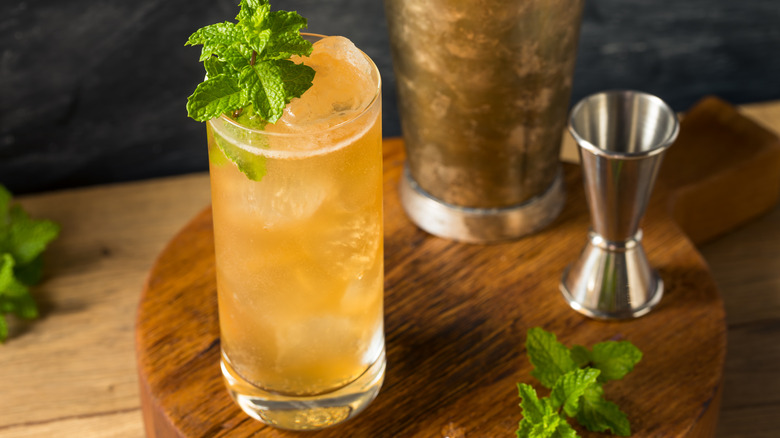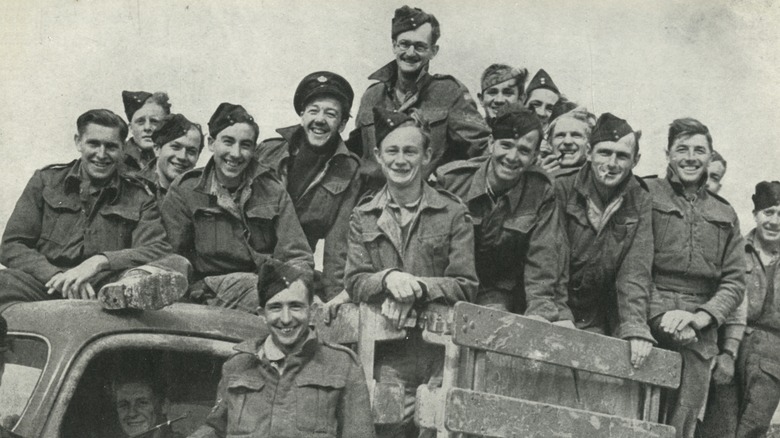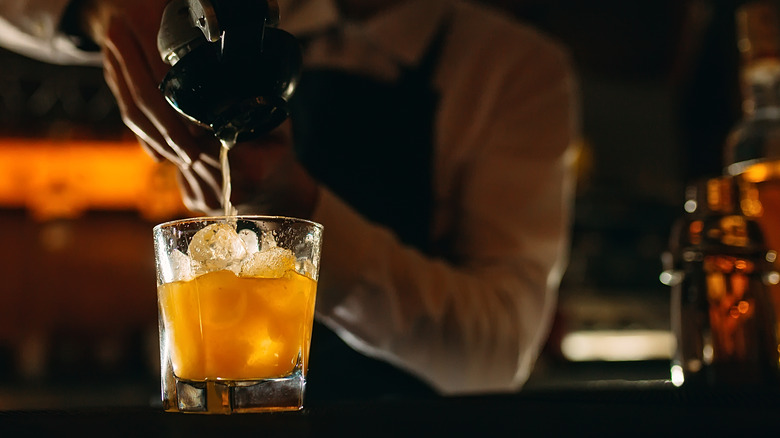The Unlikely Cocktail Born In Egypt During World War II
Lest you think that cocktails are only good for twiddling between your index finger and thumb while chatting up strangers at bars, look out: We've got some news that will definitely not discourage alcohol use. This is especially true if the folks in question are English, and there are also some Nazis nearby. Not that this often happens, or that Brits have any trouble at all drinking, but, anyway, you know — cheers, mate. Enjoy your Suffering Bastard.
The Suffering Bastard is a cocktail that comes pre-equipped not only with its own garnish, but a mythologized origin story that we're totally pitching as a screenplay one day: Egypt, Nazi busting during World War II, and world-traveling polyglot and "chemist-turned-barman" Joe Scialom. Or as We Are the Mighty explains in testosterone-laden phrasing, "The Suffering Bastard is a legendary beverage, created by a legendary barman, in time and place where new legends were born every day." As for why it was named "The Suffering Bastard"? We suppose the inventor, Scialom, just took a look at the people drinking his drink.
The tale of the Suffering Bastard — both the drink and its drinkers — does indeed go back to World War II, specifically 1941 Egypt. There was a shortage of quality liquor in the area because of the war, and bartenders like Scialom had to make do. Lo and behold: the unlikely combination of bourbon and gin mixed with lime, ginger ale, and bitters was born.
The Nazi Afrika Corps pushed to Egypt
When envisioning combat during World War II, it's easy to imagine red-and-black-frocked Nazis squaring off against square-jawed Brits, Americans, and the rest of the Allies somewhere vaguely European. In reality, the theater of war expanded far beyond Berlin, Paris, and Normandy. Combat spanned three continents in total, as handy maps on Vox illustrate, and the entire world got economically and ideologically involved. Come 1941, two years into World War II and before the bombing of Pearl Harbor that roped the United States into combat, many folks still feared that Germany might win, as Facing History describes.
In Northern Africa, Nazi Field Marshal Erwin Rommel had pushed the British out of Libya and into Egypt. The British, as We Are the Mighty recounts, wanted to push Rommel back to Tunisia on the other side of Libya, but Rommel and his Afrika Korps proved tough to handle. Rommel made it to Egyptian soil by July 1942, intending to capture the city of Alexandria and the Suez Canal and split the British forces, as the National World War II Museum explains.
In July, 1942, British commander-in-chief in the Middle East, General Claude Auchinleck, decided he'd had enough. He took direct command of the Eighth Army and made a stand at an unlikely location, the railway stop El Alamein. It took a Herculean effort, but Auchinleck's Brits won and Rommel's Afrika Korps was repelled. And to what do some folks credit this turnaround? Why, the soothing burn of a happy intoxication.
Mix well, but shake politics
Here's where we steer from straight-up historical fact and into the realm of romanticized tales featuring Joe Scialom, our alcohol-pouring hero. Scialom worked at the Shepheard's Hotel in Cairo come 1942, a city occupied by Brits who watched Nazi Field Marshal Erwin Rommel and his Afrika Korps bear down on their position month after month. British troops, as Sofrep says, frequented Shepheard's Hotel and chatted up Scialom, who in his obituary was described as "sometimes glad, sometimes sad, often mad, but always provocative," via Grand Hotels Egypt. Scialom was a chemist turned mixologist, spoke eight languages, was world-traveled, and often deployed the catch-phrase "mix well but shake politics." Rommel himself seemingly knew of Shepheard's Hotel, too, and as We Are the Mighty quotes, once boasted, "I'll be drinking champagne in the master suite at Shepheard's soon."
Come 1942, Scialom must have beheld quite a few suffering bastards coming in and out of the bar, because he reportedly set out to concoct "something to quench the boys' thirst," as Sofrep explains. Supplies were short, options were limited, so he whipped up a drink that "combined equal parts gin and brandy" (some accounts list bourbon instead of brandy) "with a dash of Angostura bitters, a teaspoon of Rose's lime juice, and English ginger ale." Garnishes could include mint, a slice of orange, or a cucumber peel. The name of the drink? The Suffering Bastard. Or for those who took issue with the roughness of the name, the Scialom-describing "Suffering Bar Steward."
Morale booster and hangover cure
At this point, you may well be wondering, "How exactly did the Suffering Bastard help win a war of battle tactics and soldier-to-soldier combat prowess against Nazi Germany"? Well, at the very least the drink is credited with being a "morale booster," as Sofrep says. Although to be honest, someone could have probably bottled the stuff, stuffed a rag down the neck, and made a combat-ready Bastardized Cocktail to rival the typical Molotov version. It would have been wasteful, sure, and perhaps not as effective at emboldening troops as intoxication. But you know, the option is always there with flammable liquids.
Another way the Suffering Bastard might have ameliorated suffering? By circularly curing hangovers caused by earlier visits to Scialom's bar, as Windharma postulates. The hangover-curing powers of alcohol are of course a complete myth regardless of the type of drink (explained by the National Institute on Alcohol Abuse and Alcoholism), but at the very least Scialom's drink might have helped keep troops calm, distracted, or loose.
Or, perhaps the truth of the matter lies in Scialom himself, who may have imbued more than a bit of his own powers of charisma into his drink. There's a reason we've got so many cultural stereotypes about folks unloading their woes, drunkenly, onto the ears of a cheaper-than-average therapist, i.e., a bartender. In that way, all it might take is one especially person-savvy bartender to help turn the tide of a world-shaking conflict.
If you or anyone you know is struggling with addiction issues, help is available. Visit the Substance Abuse and Mental Health Services Administration website or contact SAMHSA's National Helpline at 1-800-662-HELP (4357).



